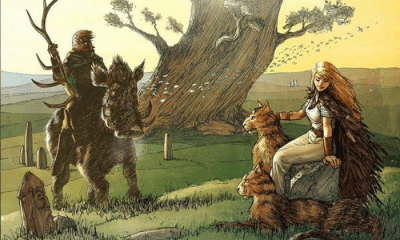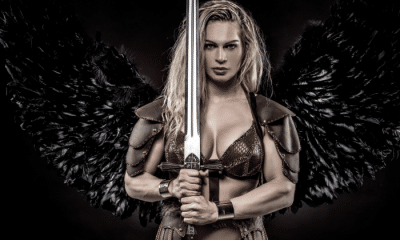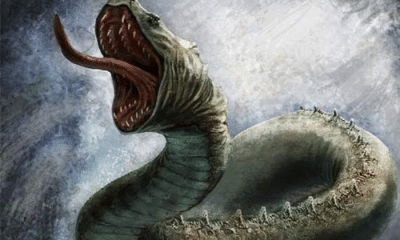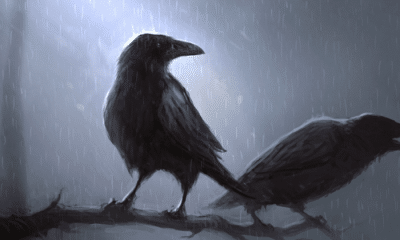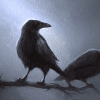
Norse
Who is Jord in Norse Mythology?
Who is Jord in Norse Mythology?
In Norse mythology, Jord is best known as the mother of Thor. Is there more to her story, though?
While many gods and their family members are rarely mentioned in surviving Norse sources, Thor’s mother is well-attested.
Her name was Jord and she was generally identified as a giantess. Although no details survive of their relationship, at some point she was paired with Odin and they gave birth to his most famous son.
Despite these prominent relationships, however, Jord never appears as a character in her own right. There are no stories in which she speaks or is even mentioned as present at important events.
Some historians still see a reason to believe, however, that Jord was once a prominent character in earlier mythology. While her individual story has been lost, the meaning of her name and the identity of her son lead some people to theorize that Jord may have once been a major mother goddess of Germanic religion.
Jord and her Famous Son
According to many Old Norse sources, Jord is the mother of Thor.
She is described most often as a jotunn, or giantess. This term, however, did not denote either size or disposition in Norse myths.
Many jotnar women married Aesir gods or bore their children. These relationships were both common and normalized, making it clear that there was little distinction between the women of the two races.
This is backed up by the fact that Jord also appears in some lists of the goddesses. Although she was a giantess, there was nothing unusual in her role.
No myths survive that tell the story of how Jord and Odin became the parents of Thor. Unlike the Greeks and Romans, the Norse people did not extensively write about the personal relationships and dramas of their gods.
Although Odin was married to Frigg, at some point he had at least one child with Jord. This was Thor, the powerful and popular god of thunder.
Jord’s name is among the most well-attested in Norse mythology. Thor is often called “Jord’s son” and she is listed with other mothers of Odin’s sons as one of Frigg’s rivals.
She also has the distinction of having a clear family lineage given in at least one source. Many characters in Norse mythology, even more prominent gods, had no such records.
According to the Prose Edda, a giantess whose name meant “Night” was Jord’s mother. Her father was this giantess’s second husband and her grandfather, Night’s father, was Narfi.
In a few cases, sources name another woman as Thor’s mother. Most of these, however, are agreed to be alternative names for Jord rather than entirely separate characters.
Despite the many uses of her name and the prominence of her son, however, little else is said of Jord in surviving legends. While she was counted among the goddesses there are no myths that give her a speaking role or name her among the deities present at an important event.
My Modern Interpretation
One of the reasons Jord is so well-attested in primary sources is because of the meaning of her name. As a noun, jord means “earth” or “soil.”
It is often difficult, therefore, for historians to distinguish which references specifically talk about the goddess. Some passages could be more generally speaking about the land itself.
The meaning of Jord’s name does more than cause confusion in translation. It may also point to an older tradition within Norse mythology.
Odin’s wife is traditionally given as Frigg, a goddess whose domains included the family and childbirth. Frigg was the mother of two of his sons, Baldur and Hodr.
While Baldur was well-loved, however, he was never as powerful or popular as Thor. Both textual and archaeological evidence shows that Thor was one of the most highly-regarded and widely-worshiped gods of the pantheon.
Some scholars believe that this importance may be, at least in part, because Thor was once considered to be Odin’s rightful heir.
Jord, they believe, was Odin’s wife in earlier versions of the legends. As the mythology developed and evolved, the goddess of the earth was replaced by a more domestic, cultured mother figure.
Some evidence for this seems to survive in well-known texts. One segment of the Prose Edda, for example, claims that “The earth was Odin’s daughter and his wife,” and calls Thor the god’s first son.
As there is no other record of this tradition, some think that it reflects an older, otherwise lost, story in which Odin married an earth goddess who was also a daughter or other close relative and had Thor as his heir.
Scholars believe that comparative mythology also makes a case for this interpretation.
One prominent anthropologist sees parallels between Thor and other characters from Indo-European mythology. These gods, he notes, are often the offspring of the chief god and a goddess of the earth.
Conventions in Norse writing also seem to support this theory. Although Jord was a jotunn, the way she is listed among the other goddesses is in keeping with jotnar women like Gerdr and Skadi who married into the pantheon.
Changing belief could also provide an explanation for while Jord was referenced so much but had no myths of her own. As Frigg took her place as Odin’s wife, Jord’s individual stories may have been reassigned to the more prominent goddess.
It is possible, then, that in pre-Viking Age belief Odin was married to an earth goddess instead of Frigg. While she was replaced in later stories, her name and the prominence of her first-born son remained in Norse belief.
In Summary
Jord is well-attested in Norse mythology as the mother of Thor. His father was Odin, but no legends survive that tell the story of his birth.
Jord is often called a jotunn, or giantess. She is also referred to as one of the goddesses, however, in a manner that is typically for female jotnar who married Aesir gods.
Although she is referenced many times, no myths survive that show Jord as a fully-developed character. She does not appear in the company of other deities or seem to play any role beyond that of Thor’s absent mother.
Some historians theorize, however, that this was not always the case.
Jord’s name directly translates as “Earth.” Her pairing with Odin would seem to be in keeping with the marriages of chief gods and earth goddesses in other Indo-European traditions, as would the prominence of her son.
Clues in the texts indicate that Jord may have once been cast in the role of Odin’s wife. This position was gradually taken by Frigg and Jord remained only as the mother of a single god without any connected mythology.


